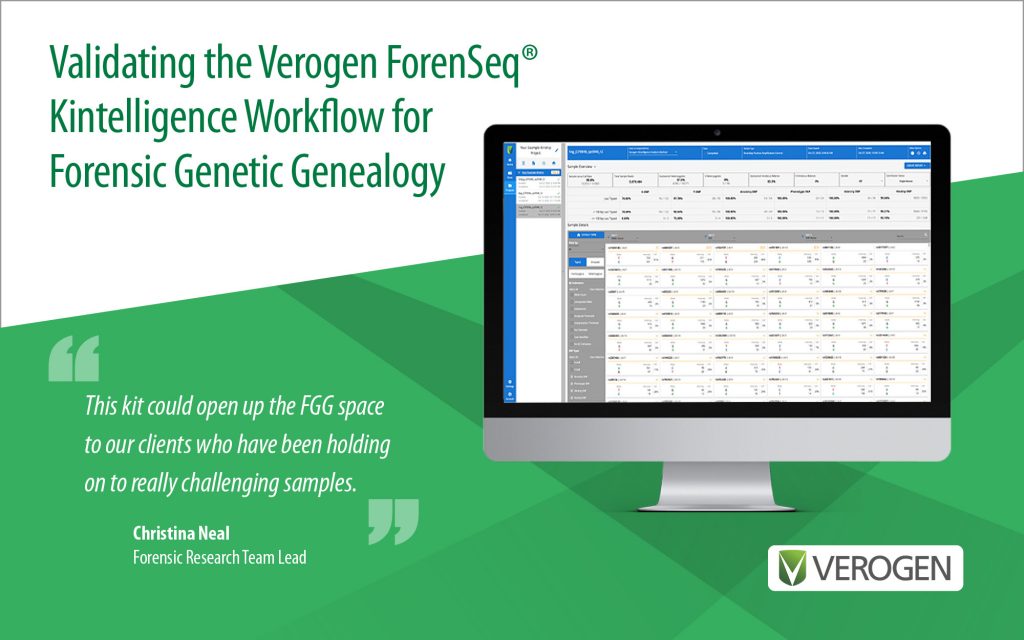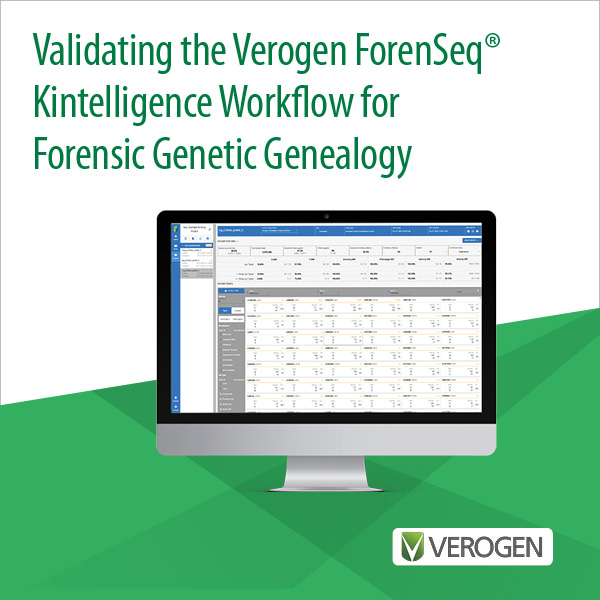
AUSTIN, TEXAS – July 14, 2021 – Forensic scientists from the Center for Advanced Genomics (CAG) at Signature Science are validating the Verogen ForenSeq® Kintelligence workflow for the NDIS-approved MiSeq FGx® Sequencing System. ForenSeq Kintelligence, a new integrated forensic genetic genealogy (FGG) solution based on next-generation sequencing technology, targets forensically relevant markers along with ancestry, identity, and phenotype markers to estimate kinship. The workflow is optimized for degraded and low-input DNA samples from a range of sample types including blood, bone, buccal swabs, hair, teeth, and semen. Upon completion of the validation study in fall 2021, the CAG will add the workflow option to its FGG service offering.
“Our scientists had a close-up look at the kit’s performance as participants in Verogen’s interlaboratory study evaluating Kintelligence in 2020,” said Christina Neal, Signature Science’s forensic research team lead. “We saw the utility of the workflow and Verogen’s testing with degraded and inhibited casework-type samples exhibiting high recovery rates. We knew then that this kit could open up the FGG space to our clients who have been holding on to really challenging samples.”
Signature Science’s current FGG offering, a microarray genotyping-based service, features sample extract quantification and preparation for SNP genotyping by CAG forensic scientists using the Infinium® Global Screening Array (GSA)-24 Kit [Illumina]. Samples are run in-house on an Illumina iScan®.
“FGG is already proven to be a powerful means for lead generation to solve cold cases. In our advanced genomics laboratory, we’re optimizing microarray genotyping and bringing whole genome sequencing online to support the overall FGG workflow,” said Sara Szmania, a founding Director at Signature Science. “But, while these methods are powerful in their own right, they are not necessarily optimized to support forensic casework. Adding ForenSeq Kintelligence will enable the CAG to address current limitations and to have a full suite of genomics technologies to apply to our clients’ challenges now and in the future.”
In their 2019 developmental validation of SNP genotyping using the GSA for samples run on the iScan, CAG scientists were able to show sensitivity to DNA input levels down to 0.2 ng, three orders of magnitude lower than the manufacturer’s recommended input of 200 ng. In the planned ForenSeq Kintelligence validation study, CAG scientists will incorporate bones, cremains, and spent shell casings to assess the kit’s performance at input levels lower than the manufacturer-recommended 1 ng gDNA.
“The potential of this workflow was apparent upon seeing call rates generated from contemporary bone samples subjected to the insults of cremation, burning, and embalming,” said Neal. “We’re excited to see where we can take the sensitivity level during our validation study. Ultimately, we just want to enable investigation of samples that so far have not been considered eligible for FGG.”
Initial results with sensitivity testing were promising with inputs at 0.1 ng, but a few modifications to the protocol were identified that could boost the performance. “I was encouraged by how a few simple changes to the procedure improved the performance while maintaining high accuracy of calls,” said Michelle Peck, a genomics research scientist at the CAG. “We are eager to test these optimized parameters at lower inputs and with nonprobative samples.”
The ForenSeq Kintelligence workflow data analysis component is performed with the Universal Analysis Software, and long‑range kinship estimation in GEDmatch PRO™ informs the construction of a family tree. Genealogy researchers, guided by the family tree output, work to generate investigative leads. AdvanceDNA, an identity research firm, provides forensic genealogy research support to the CAG’s FGG cases.
The CAG team routinely reviews case samples with law enforcement clients to determine suitability for FGG testing. Signature Science operates an ANAB-accredited casework laboratory in Austin, TX and has performed forensic DNA casework outsourced from local law enforcement and government entities across the U.S. since 2014. FGG validation studies are performed at the CAG laboratory in Charlottesville, VA.
About Signature Science, LLC: A subsidiary of the Southwest Research Institute, Signature Science, LLC is a scientific and technical consulting firm providing multi-disciplinary applied research, technology design and development, and scientific, technical, and operational services to government and industry.

